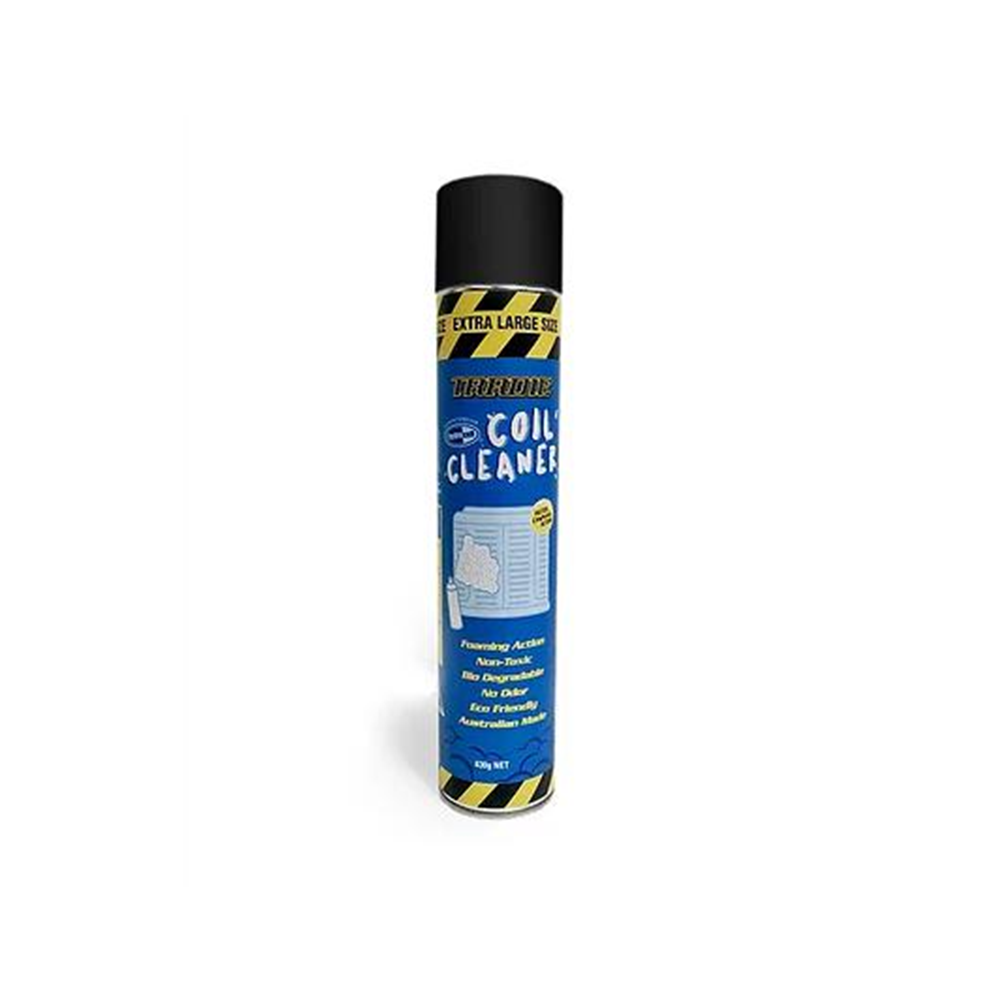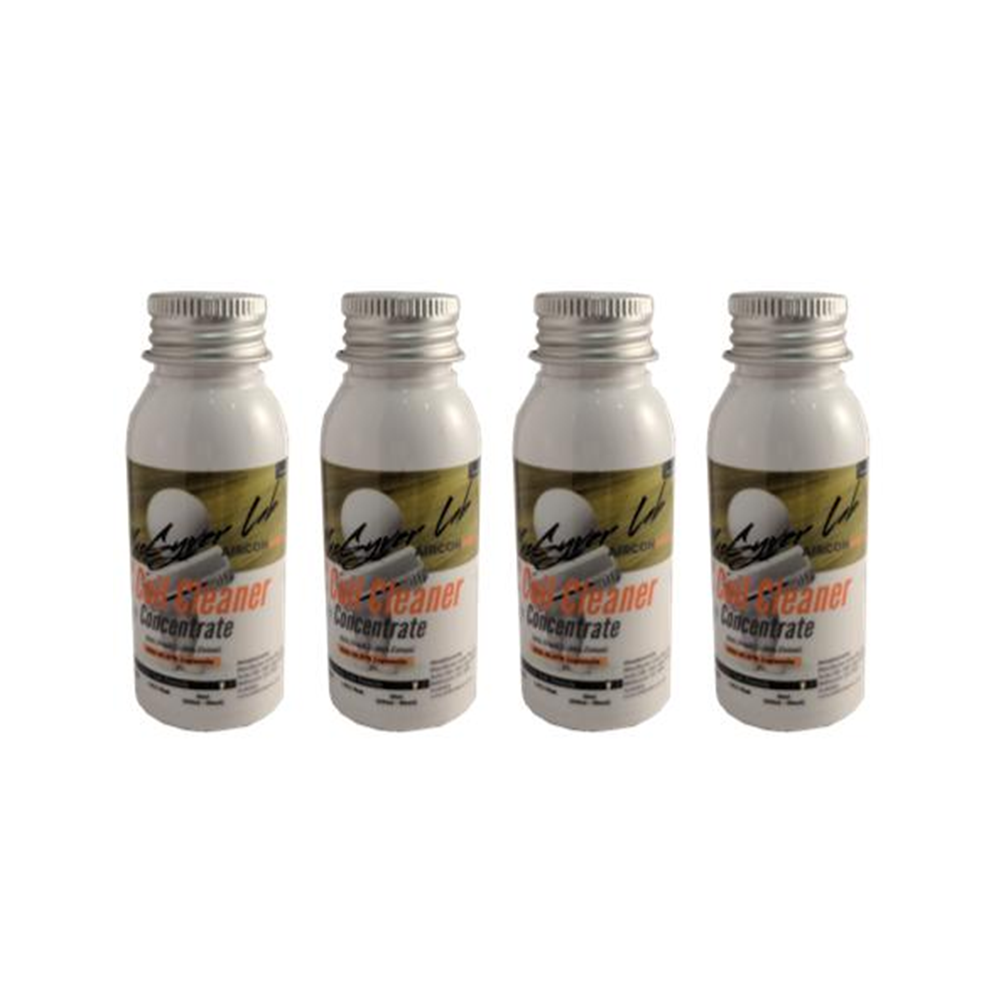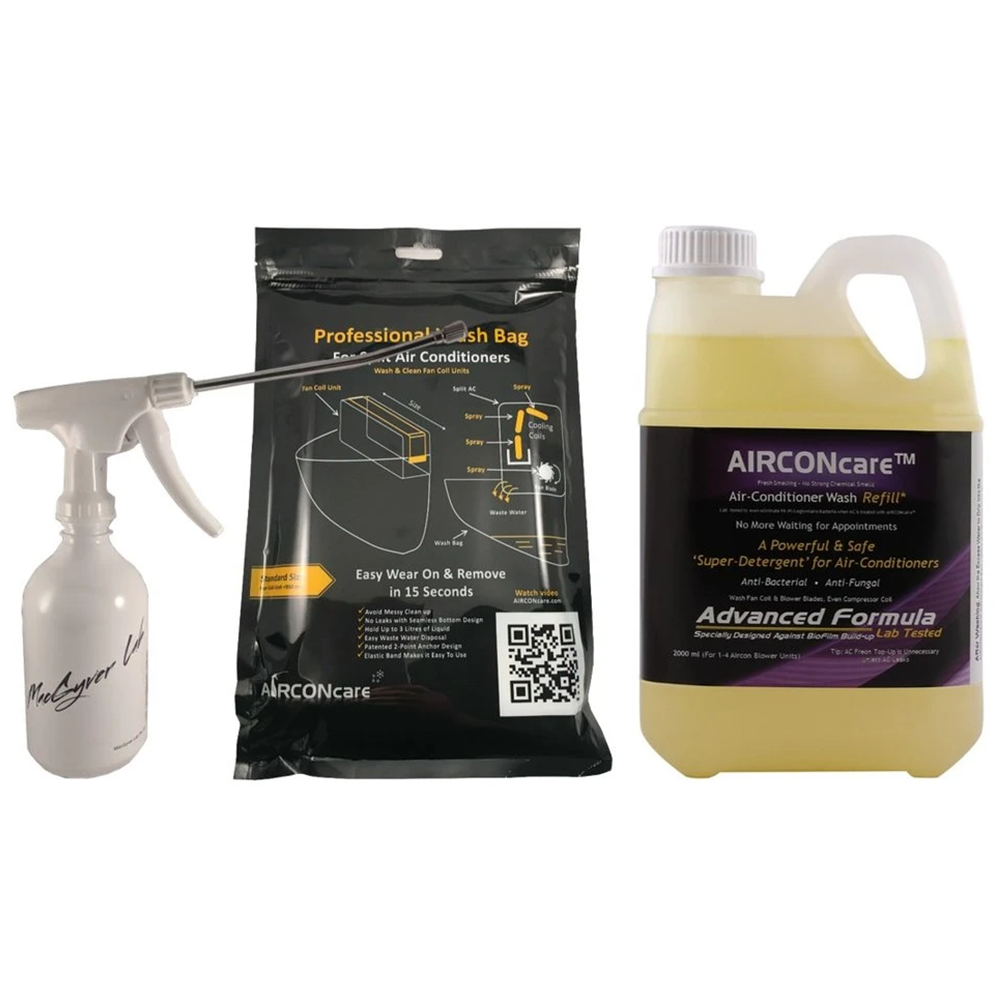
Keep Your AC Happy with Air Conditioner Coil Cleaner!
Reasons Why You Need An Air Conditioner Coil Cleaner
One of the greatest joys we appreciate on a hot summer day is walking into a cool home. However, we must make some effort to ensure that our homes remain cool and comfortable. One essential task is regular HVAC maintenance, especially cleaning the coils of our air conditioner. A reliable condenser cleaner can make this process easier and more effective, helping to maintain peak performance.
Neglecting coil maintenance can lead to higher energy costs, as dirty coils struggle to exchange heat efficiently. This inefficiency forces the air conditioner to work harder, consuming more energy and reducing its lifespan.
To prevent this, using a high-quality condenser cleaner is essential. These specialized solutions are designed to break down dirt, debris, and grime, restoring the efficiency of your air conditioning system. Regular cleaning with a condenser cleaner ensures optimal cooling performance while extending the life of your unit.
IMPORTANCE OF KEEPING YOUR COILS CLEAN
Depending on several conditions, the coils within an air conditioner can become filthy over time or very fast. You must be concerned about the dust being drawn into the system and trash from the outside. It's uncommon for householders to discover grass, leaves, or other material attached to the condenser coils outside their system. It will slow down your system, which isn't ideal when attempting to cool down.
Anything that can obstruct or obstruct airflow within your system can cause components to overheat, failing. That's just on the surface of your AC unit; if it's not maintained properly, the inside coil can cause plenty of difficulties on its own.
The inner and outer coils are parts you won't want to miss, from frozen coils and leaks to unpleasant aromas. Maintaining the coils clean lowers your energy expenditures and guarantees that your system is always working at its best. That's where the finest AC coil cleaner comes in helpful, but first, do a visual inspection to discover how dirty or accessible your system's coils are.
CONDUCT A VISUAL CHECKUP
Simply walking outside is the first step in inspecting the coils. The condenser coil is simple to find on any system because it is located outside and is usually visible through slots. It is also straightforward to reach in most circumstances. Unfortunately, it is also the most vulnerable to harm.
Plastic fragments and grass cuttings are prevalent and can easily block a system. Check for small sticks or other debris from yard maintenance or Mother Nature if it's near ground level. While debris is easily removable on some systems, we still need a few tools and a condenser coil cleaner on hand. You might not even need to eliminate it if it's a window-based system.
Dirt and dust and the buildup of grime if your unit hasn't been maintained are the most common concerns with the evaporator coil. Unfortunately, it can be not easy to access because of the sort of system. If you're dealing with a split level system, you'll likely have to remove an access panel or climb into an attic to inspect the coils.
While inspecting the condenser and evaporator coils, you may uncover other system issues that need to be addressed. If this is the case, or if you can't get to your coils, it's time to hire a pro instead of cleaning them.
DIY CLEANING OR PROFESSIONAL CLEANING
If you don't want to cope with reaching the inner coils after a visual inspection, you might choose to hire a specialist. Depending on where you live, the type of system you have in your house, and your budget, this might be a difficult chore.
Cleaning both coils can cost you anywhere from $30 to $100, depending on your cleaner and any tools you may need. It's crucial to know the price of cleaning coils manually before hiring a pro. Apart from the coil cleaner, you'll need a few tools, most of which can be found in any homeowner's toolbox.
Hiring someone familiar with HVAC systems is the ideal option in certain situations, albeit finding the proper individual for the job can be difficult. While that may be a good deal, you'll have to hire a pro if you can't get a panel off or run into problems. You can say the same for coils too unclean to clean with standard methods and require a thorough cleaning.
When you look out for coil cleaners on the internet or through outstanding handyman services, you'll immediately discover that there's no official work title for them. Some HVAC businesses may provide this service, but if it's just a minor cleaning and nothing else is malfunctioning with your system, you can also contact a trustworthy individual to perform it.
You should always receive many estimates and enquire for references when hiring someone to clean your coils. While you may want to hire the most cost-effective or greatest individual first, it is generally more cost-effective to have many people give you an estimate. Many persons who perform this work may charge for an estimate, but an HVAC company will also charge for a service call.
You should anticipate paying $50 to $150 for a coil cleaning if you hire a professional or an individual. Again, prices will vary depending on where you live and who is available to clean your AC coils. Check out our quote tool if you'd like a quote for a professional coil cleaning in your area.
TYPES OF AIRCON COILS
There are two types of coils in any air conditioning system: the evaporator coil and the condenser coil. Although both have the same appearance, they serve different purposes and are located in other parts of the HVAC system.
Evaporator Coil
The cooling coil is another name for the evaporator coil. The evaporator coil's job is to cool the indoor air by extracting heat.
You can find it near the fan's air intake, and it cools the air as it travels past it.
Condenser Coil
On the outdoor unit, you'll find the condenser coil. The condenser coil's job is to transfer heat from the inside of the building to the outside.
The condenser coil is positioned on the back of window air conditioners.
Both AC coils are commonly composed of a copper tube surrounded by aluminium fins for better heat transfer.
When coils become dirty, their heat transmission capacities deteriorate, and their performance suffers. Filthy coils make your air conditioner work harder and raise your electric bill!
Worse yet, if your air conditioner's coils are unclean, they won't run as efficiently and may struggle to cool and dehumidify your home.
TYPES OF AN AIR CONDITIONER COIL CLEANER
When buying an AC coil cleaner, the most important factor is the type.
You can use coil cleaners in various ways. Some are made of soap and dissolve dirt and residue, whereas others will take away the coil's top coating of metal (for a thorough clean!)
Acidic
Acidic coil cleansers are effective cleaners that will thoroughly clean your coils. However, if used incorrectly, they can hurt your air conditioner coils.
Acidic cleaners will remove the top metal layer on your AC coil. It implies that if you don't use acidic cleansers appropriately, they can damage your coils to leak. Even worse, acidic coil cleansers emit poisonous gases that are exceedingly harmful if breathed.
Alkaline
Alkaline cleaners are far more effective than water at cleaning your AC coil. Furthermore, alkaline cleaners are less likely to remove the top layer of metal on the AC coil, reducing the risk of damage.
While not as harmful as acidic cleaners, Alkaline cleaners are nevertheless corrosive and should be used with caution.
Solvent-Based
Solvent-based coil cleansers dissolve residues to clean AC coils. They work well to clean oil and smoke residue but do not eliminate significant buildup or corrosion.
Solvent-based cleaners are quick to work with, and you won't have to rinse the coil afterwards. Solvent cleaners have the disadvantage of being combustible and producing strong scents when used.
Detergent-Based
Detergent-based cleansers are soapy cleaners with foaming agents and surfactants to aid in cleaning. Many detergent-based cleaners are easy to use and come in a spray can.
After using these cleaners, you'll probably want to give them a good rinse with water. Some of the newest detergent-based cleaners on the market now have the advantage of being environmentally friendly.
HOW TO CLEAN AC COILS USING AN AIR CONDITIONER COIL CLEANER
AC coils are susceptible to accumulating dirt and grime. Therefore they may need to be cleaned frequently, especially if the condenser coils are exposed to the elements. Maintaining and cleaning your AC coils as required should be part of your regular HVAC maintenance.
General Steps
Step 1: Turn off your aircon.
The first step is to disconnect your AC unit from the power source. When you turn off the power at the disconnect, the AC unit is entirely de-energized, and you won't get electrocuted when cleaning the coils.
It's also good to let the stored electricity from the AC unit's internal electrical components evaporate for a few minutes after shutting off the power.
Step 2: Access aircon oil.
The next step is to obtain access to the coil of the air conditioner so that you can clean it. To expose the AC coil, you may need to unscrew screws and panels, depending on the manufacturer and type of your AC unit.
Step 3: Start cleaning the coil.
It would help if you cleaned the AC coil in the third stage. There are several
- Using compressed air, blow out the dust from the coil.
- Use a vacuum cleaner, and remove dust from the coil.
- Using a water hose, saturate the coil.
- Use a coil cleaning solution for your air conditioner.
- Cleaning your AC coils with compressed air or a vacuum pumps is the most straightforward method and is recommended for mild dust buildup.
If you're blowing compressed air into your condenser coils, be sure you're blowing the dust OUT rather than IN it. You don't want the dust to sink deeper!
Suctioning the dust out of dirtier coils may not be enough, and you'll need to spray the coil using a water hose to remove dirt and grime.
An AC coil cleaning solution is indicated for the dirtiest coils to remove persistent built-up grime. Scraping off the residue with a coil cleaning brush or coil cleaners is advised.
How to Clean Evaporator Coils
Things can become messy with the evaporator coil, especially if it's never been cleaned. Before you start, you'll need to turn off the electricity to your unit and get some evaporator coil cleaning, which we'll go over in our instructions below.
The most important thing to remember about evaporator coils is that they might be difficult to reach, and you must be careful not to bend or damage the fins if they are heavily clogged. You'll also want to wear eye protection and set aside some time because cleaning the evaporator coil takes longer, and you'll need to be careful around the drain line and drip pan.
While it is feasible to clean the evaporator coil without difficulty, due to its placement, it may be more convenient to hire an HVAC specialist or someone who has experience cleaning coils.
How to Clean Condenser Coils
It's critical to turn off the power to your system before you begin. Before cleaning your air conditioner, ensure the power is turned off, whether pulling a box or switching a breaker or switch.
You must be able to see any debris on the condenser coil that could cause your device to malfunction. Weeds or tall grass sprouting around the pad or on the exterior are examples of this. You can use a coil brush to remove debris from the system. While it may be tempting, avoid using a paintbrush or anything else that could damage the coils because a good coil brush is not pricey.
It's good to inspect the fins for damage after removing the debris. Use your fin comb to remove any remaining debris from the exterior fins. It's time to get your coil cleaner once you're satisfied with your work. The steps will vary based on your purchase solution, so follow the manufacturer's instructions.
Your unit should be ready to go if everything is in order. It's good to inspect the condenser coils for damage or bent fins after being cleaned. Depending on your system, you may need to uninstall the fan or other parts, so you might still have to hire a professional. Consider hiring a professional if your cleaning had little to no effect.
FACTORS TO LOOK FOR IN AN EFFECTIVE AIR CONDITIONER COIL CLEANER
A few things distinguish air conditioner coil cleaners from one another. When shopping for the best air conditioner coil cleaner, keep the following features in mind:
Easy to Use
Your best chance is to use a simple cleaner to set up and use.
After all, the whole goal of utilising coil cleaners is to make your job easier, so why use one that is difficult?
Some aircon coil cleaners come in a spray container, making application a breeze.
Other coil cleaners are available in large bottles. You'll need to dilute the solution with water for these cleaners. After that, pour the fluid into a pump sprayer and use it to spray down your coils.
Foaming
Some air conditioner cleaners will bubble up when sprayed onto an AC coil.
Some people believe that the coil cleaner must constantly foam. However, this isn't always the case. If a coil cleaner foams up too much, it will limit the cleaning solution from reaching all of the coil's surfaces.
Excessive foaming will also push dirt and debris towards the coil's centre, making it more difficult to remove.
The fact is that some foam is beneficial, but too much is not. To maximise the cleaning power of your coil cleaner, use a small amount of foam. When cleaning a coil without overpowering it, mild foam is your best bet.
Capacity and Price
Everyone enjoys a good bargain. The majority of homeowners choose to save money. When it comes to cleaners, capacity is usually a factor, and HVAC coil cleaners are no exception.
Purchasing a gallon of cleaner may appear to be a good value, especially considering the short shelf life of many items. So, how frequently are you going to clean your coils? If this is your first time, it's best to buy a smaller quantity, as it's likely a purchase you'll regret shortly.
Choosing a lower capacity helps you evaluate if you enjoy a product before committing unless you are already sold on a brand. That's great if you're not sure what you're searching for, but it'll cost you more in the long run unless your coils aren't particularly unclean, to begin with.
Spray cleaners are available for evaporators and condensers, but they are most commonly used on standard rather than microchannel coils. In our experience, aerosol cans are typically 16 to 18 ounces. You can buy single cans, but a double-pack will save you money.
There are much more options available if you choose gallons to aerosol cans. Except for a few companies who sell 5-gallon pails, most products are offered in 1-gallon jugs. However, you will have to pay more upfront for something you will only use seasonally.
Safe to Use
Some AC coil solution are safer to use than others, as previously stated.
You'll need to pick what kind of coil cleaner you want to use. Whether it's safe to use in the environment, you'll be utilising it based on your situation. Some cleaners are harsh and hazardous to touch, while others are gentle and environmentally friendly.
Acidic and alkaline-based coil cleaners, in particular, are hazardous to use. Solvent-based cleaners can produce vapours that are not advisable to ingest.
Detergent-based coil cleaners are generally the safest to use.
FINAL THOUGHTS
One of the most important aspects of HVAC maintenance is air conditioner coil maintenance. Though it may appear difficult at first, numerous tools, strategies, and solutions are available to make this task easier.
Clean AC coils nearly always equal a decreased electricity cost, which is one of the most significant advantages of routine AC coil cleaning.
One of the simplest and quickest ways to clean your air conditioner coils is using an AC coil cleaner. Our coil cleaning solutions are great for DIYers and HVAC professionals. Buy an air conditioner coil cleaner from HVAC Shop in Australia today.






